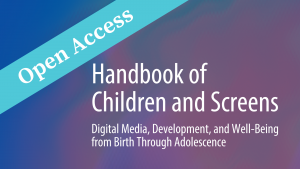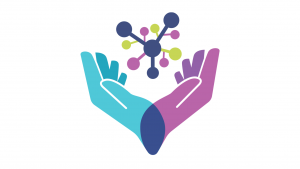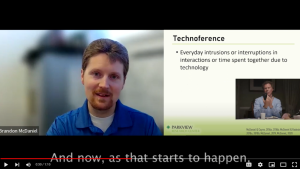Parents increasingly recognize how family screen time shapes child development. But that awareness can bring guilt or shame when digital devices creep into daily life. On this episode of Screen Deep, host Kris Perry talks with Dr. Lara Wolfers, a leading researcher on how stress and guilt intersect with family media use, and Assistant Professor of Digital Lives and Head of the Center of Digital Lives at the Faculty of Psychology at the University of Basel, Switzerland. Dr. Wolfers explains when guilt can be constructive versus when it can be harmful to the parent-child relationship. She offers suggestions for navigating societal pressures and daily demands, and encourages parents to practice self-compassion.
Listen on Platforms
About Lara Wolfers
Lara Wolfers is a tenure-track assistant professor of digital lives and heads the Center of Digital Lives at the Faculty of Psychology at the University of Basel, Switzerland. Her research in media psychology focuses on how digital media shape well-being and social relationships in everyday life, with a particular emphasis on family media use, especially parental smartphone use, social norms, and digital coping with stress. She studied Communication Science in Mainz (B.A., 2014) and Hohenheim (M.A., 2018), and earned her PhD in 2021 from the Leibniz-Institut für Wissensmedien Tübingen. From 2021 to 2025, she was an assistant professor at the University of Amsterdam. Her research was published in journals such as Human Communication Research and Communication Theory. She serves on the editorial boards of Human Communication Research and Mobile Media & Communication and is spokesperson for the Media Use and Effects Division of the German Communication Association (DGPuK).
In this episode, you’ll learn:
-
- How parents use media for coping and media use links to stress and guilt.
- Why social standards around limiting digital media use can cause guilt and stress – yet also help adults curb their own use around children
- How parent guilt and stress around screen habits can negatively impact parent-child relationships
- Why being more intentional with media use can restore control and ease guilt and stress.
- Why there is a disconnect between how we judge others’ media use vs. our own use
- Which variables matter when deciding if screen time is “good” or “bad”
Studies mentioned in this episode, in order of mention:
Wolfers, L. N., Wendt, R., Becker, D., & Utz, S. (2023). Do you love your phone more than your child? The consequences of norms and guilt around maternal smartphone use. Human Communication Research, 49(3), 285-295.
Wolfers, L. N. (2021). Parental mobile media use for coping with stress: A focus groups study. Human Behavior and Emerging Technologies, 3(2), 304-315.
Wolfers, L. N., Nabi, R. L., & Walter, N. (2025). Too much screen time or too much guilt? How child screen time and parental screen guilt affect parental stress and relationship satisfaction. Media Psychology, 28(1), 102-133.
[Kris Perry]: Hello and welcome to the Screen Deep podcast where we go on deep dives with experts in the field to decode young brains and behavior in a digital world. I’m Kris Perry, executive director of Children and Screens and the host of Screen Deep.
Today I’m joined by Lara Wolfers, an assistant professor of digital lives in the faculty of psychology at the University of Basel. Dr. Wolfers’ research lies at the intersection of psychology and communication science. And her work has investigated the role of parental stress and guilt, and how those feelings impact their self-perceptions and behavior in both their own and their children’s media use.
In this episode, we’ll learn more about what sets her research apart and how we can better understand the complex dynamic of parent-child relationships, screen time, and parent guilt and shame. Let’s dive in.
In many ways, we think and speak of parenthood as a magical time in one’s life, full of wonder, joy, and pride. And while those feelings are part of parenting, there are other feelings that get far less attention, and as a result, they’re surprising and may even lead some to feel there’s something wrong with them for feeling confused, or insecure, or embarrassed by not knowing how to do everything perfectly.
I experienced those feelings and my children grew up before smartphones and social media, so I often marvel at how parents today balance the challenging feelings endemic to parenting caused by the opaque challenge of today’s fast-paced media world. And if I felt self-conscious turning on Sesame Street or Cartoon Network 20 years ago, how do today’s 24/7, often low-quality media options impact parent self-esteem?
To help us unpack these complicated emotions, let’s lean into the growing body of research on parent stress and guilt surrounding media use. There are a few different aspects of stress around media use. First, there’s using media and smartphones as a stress relieving exercise, and then there’s stress that can sometimes be created about the media use, and then from the experiences or content online.
Let’s start with the first one, Lara. What do you know about how people use smartphones and other devices as stress relievers?
[Dr. Lara Wolfers]: Yeah, so we see in a lot of studies that stress and media use is really strongly connected. So we see that oftentimes when people use more media than usually, or when they feel more stress than usually, then the other thing goes also up as well. So we see more media use, more stress, or more stress, more media use. The question is then, of course, “Is media use actually causing stress or is stress causing media use?” And oftentimes we see that it’s actually both. And it’s usually stress causing media use more, so that’s the stronger effect that we see.
And we can use media for a lot of different things. So we see that people use it for just taking a break, or we see people using their smartphones to get information or to get support. So there’s a lot of different ways how you can use media when you’re stressed, so there seems to be a strong connection and a lot of people do that.
[Kris Perry]: Do some uses of media or intentions around it seem to help relieve stress better than others?
[Dr. Lara Wolfers]: It’s really hard to say that, actually. Also in the original, I say, like, “older” stress studies, we already saw that it’s not one thing that you do that’s always helping you. So it really depends on what stresses you out. Is that your kid’s sick, for example, or that you really have too much things to do. So depending on what stresses you out, where you are, who’s with you, et cetera, this all changes which behavior in terms of stress coping is really beneficial or not.
So what’s usually the most effective way to deal with stress is to be flexible so that you’re flexibly can react to this stress that you’re having at this moment and to also adapt. So if you note, “Okay, something’s not helping me,” then to change and then try something else. And that’s also the same for media use.
[Kris Perry]: So when media use is causing stress, are you finding the stress is more screen time or content related?
[Dr. Lara Wolfers]: It’s actually hard to disentangle that in our studies, but I would say usually there’s two kinds of stress, especially in the parent and child context. So one is really what you’re seeing and also the messages you’re getting. It’s a lot of negative, oftentimes a lot of negative content that we’re looking at, especially at the moment where there’s a lot of negative news. That’s oftentimes causing stress. And then we all have these notifications on our phones. So when you open your email, you see 100 unread messages, of course that’s, like, causing stress. I think many people can relate to that.
And then specifically in the parenting context, but actually also when you don’t have kids, we also see people stressing that they are on their phone because they feel they shouldn’t be. And then it’s not really the content that they’re seeing, but rather like that the norms around this using media is like so negative that you feel you really shouldn’t be on social media or on your phone and you still are and then you’re also stressed and then it’s more about really the time that you spend with the device.
[Kris Perry]: I mean, it’s kind of interesting. So much of what we hear when adolescents are using their devices for long periods of time is that they are having a pleasurable experience, that they’re experiencing dopamine and they’re in a flow state and things are going great, you know? And in fact, right, the negative content or the notifications or the other stressors that are involved with being on a device can cause a lot of negative reactions. So that’s really helpful to learn more about.
So, what about parent guilt? I know many parents feel guilty when they allow their kids a lot more screen time than they think might be healthy, or they feel like their own screen use might be unhealthy in some way. Tell us more about the research on parent guilt.
[Dr. Lara Wolfers]: Yeah, so we did studies on exactly those two things. So parents feeling guilty about letting their child use more media than they think they should let them use, but also parents feeling guilty about using their own devices while being with their children. And we see that both of this is like a very common experience. I think also a lot of people know this feeling. It’s also because when we especially look at parents letting their children use screens, that usually parents don’t really adhere to their own ideal standards. So, most of the parents say, like, “That’s my ideal use of the kid,” and often that’s a very limited use, and then, “That’s what I’m actually doing, and I’m quite far away from what I think the ideal use should be.” And that’s the root cause of guilt. If there are standards that you’re not adhering to, then your body reacts with guilt. So that’s kind of the emotion that’s really there for this. So we see that there and we also see that with parents using their own devices because there they also feel like they shouldn’t be doing that and when they kind of catch themselves like being on their device while they’re being with their children, then this causes guilt.
What I’ve also experienced when talking to parents in a study, in a qualitative study, was also that parents actually get called out for being on their device quite a lot so that for example, their partner says like, “Why are you on your device? You are with your child,” or also other family members say that or even strangers sometimes in the bus, like, “Why are you on your phone? You should be, like, talking to your child.” And that, of course, is something that’s really related to negative emotions. If somebody tells you like you’re doing something that’s bad for your kids and most parents want to do what’s best for their kids. So if they feel they do something that’s bad for their kids, it’s really related to guilt.
[Kris Perry]: Well, that example really hits home and I feel that come up when I’m in public and seeing parents and children using devices. And I also know how complicated it is. This is a really tough area of parenting. Is parent guilt the same as parent shame? And if not, how are they different?
[Dr. Lara Wolfers]: Yeah, it’s guilt and shame is really like a hard study topic because – so how we scientifically distinguish shame from guilt is that shame’s something that’s really connected to your personal identity. So you feel shameful about who you are as a person. That’s kind of shame. So we’ll feel bad about who you are as a person. And guilt is rather connected to behavior. So I’m feeling guilty for doing this thing that I shouldn’t be doing, but that doesn’t make me a bad person.
And I think, also connected to media use, these two emotions are quite close together because sometimes you feel you’re doing this, like this behavior, and you’re feeling guilty about, but you feel this makes you a bad parent. And then it goes into the direction of shame. And that’s really hard then to distinguish, I think, scientifically, but also if we ask people, it’s really hard. And then we have also the words that we use for these emotions, not really always matching the scientific description of this. It’s really hard to say.
I would say that it’s, we talk a lot about guilt, but sometimes it really goes in the direction of shame because parents feel really strongly about them, like letting their kids use media. But usually we’ll look at it as guilt because guilt is the thing that’s connected to the behavior. And that’s what we’re primarily look at in the moment.
And then it’s also really interesting, I think, because emotions, especially guilt and shame, are really different across cultures. So for example, in German, you can’t really use “guilt” when you ask people because that’s a very strong word, while in English it feels it’s less strong of a word. So you can ask somebody, “Do you feel guilty?” without accusing the person of something that’s super bad. Well, in German, that’s a little bit different. So there you have to be very sensitive how you ask and that changes then what you will find.
So yeah, it’s quite hard also really to distinguish. I would also say the research findings that we have, don’t really give a clear answer. Is it shame or is it guilt? At the moment it’s quite, yeah, meshed together in a way.
[Kris Perry]: Can you help us understand better the origin of guilt and shame and does that help you understand those feelings better as a scientist? Given the cultural differences that you just mentioned, I wonder if the origin of those feelings is the same or different.
[Dr. Lara Wolfers]: Yeah, I think – I’m not really the expert on where these emotions evolutionarily come from. I think for guilt, this is really an emotion that we feel to actually change our behavior and to be more in line with what society expects of us. We’re social animals, we’re expected to behave a certain way. And guilt is one of these emotions that adapts or regulates your behavior in a way that you say, “Okay, I’m not in line with norms, but I should be,” so you change it. So guilt is not necessarily bad. If you feel that sometimes and you feel, “Okay, that’s not something that I should be doing.” then guilt can be a motivation to change.
And I think for media use, that’s the same thing. So if it’s kind of on a level that’s still okay, and that it helps you motivate you to do something differently and closer to maybe what you want, like the way you want it to be, then that’s great. But if we see that like popping up all the time and you can’t really use it as a motivation to change, then it becomes problematic. And I think that’s also what research shows is that a little bit of guilt is, like, not a problem, it helps you. But if you have that constant feeling of you’re doing something wrong, then it’s really problematic.
[Kris Perry]: How is this guilt relating to the parent stress we were talking about earlier? Are you looking at those things together?
[Dr. Lara Wolfers]: Yes. Yes, the guilt can also be a stressor. I mean, stress is something – it’s also an emotional feeling that you have to behave in a certain way, to take action. So it’s like your brain is telling you, “Do something about this. You’re in a dangerous situation in some way.” Like, it can be super dangerous or a little bit dangerous situation. But the first thing is stress tells you to do something. And guilt is also kind of a way to – it stresses you out, then you change something. So that also works in a similar way.
And what I looked into specifically in one study was looking at if we maybe use – and I talked about this in the beginning – we use media a lot for stress coping and we try to relieve stress with it. So if that’s a successful behavior for you, so if you need your five minutes because you’re really stressed out from your kids and you need five minutes, and after these five minutes – and I have parents tell me that, “I’m actually happy again. Like I can breathe again and I feel I can look at my child again, we can be happy together again.” Then this sounds like a quite adaptive behavior that’s, like, not a problem at all. But if we now have these very negative norms where people feel guilty about all their media use, then this guilt can kind of take away this benefit because then you have your five minutes on your phone, you look at your child again, think, “Okay, I feel better, but no, I shouldn’t have been doing that.” And then you feel guilty. And then it kind of takes away this positive aspect. And think that’s where these two are related. That sometimes the norms that we have that can be protective as well, so they can help you change, maybe overdo it and lead to us making something a bad behavior that’s maybe actually good and helpful in the moment for a specific parent.
[Kris Perry]: What are the other consequences of parent guilt besides stress? For example, does parent guilt affect the parent-child relationship?
[Dr. Lara Wolfers]: Yes, so we have one study where we actually found that. So we saw that the parents who felt more guilt than the other parents, they also felt more stress. And then the stress across time actually was related to a lower parent-child relationship satisfaction. This was all parent reported, so parents said they felt worse about their relationship.
But I think it’s an indicator that this guilt and also these norms connected to that can really introduce stress and also conflicts into families that don’t have to be there. So sometimes media use is a problem, especially if it’s too much, if it’s the wrong content, et cetera. But sometimes it also helps parents to just, I don’t know, have half an hour for, I don’t know, making – like, doing the dishes or whatever. And then this guilt comes in and you think like, “I shouldn’t have been doing that.” Then you’re more stressed and you have more conflicts with your child and the child maybe doesn’t want to stop the media use. And then you’re in this very, yeah, not good situation where everyone’s not feeling really good about the situation.
Well, if you’re a parent who feels, “okay, I’m doing this right. I have half an hour and that was great. And now we’re stopping it and I feel confident about what I’m doing,” then I also think, actually, there’s less conflict. Even though it’s the same situation, your emotions change, your level of confidence change, and then you have less conflict and a happier parent-child relationship.
[Kris Perry]: Does parent guilt actually end up changing screen time amounts or the behaviors of the family around screen time?
[Dr. Lara Wolfers]: I’m not aware of studies that actually tested that yet. So I don’t really know. My sense would be no because the problem that we have at the moment is that parents don’t feel they are in control. And I think that’s problematic. So they don’t feel in control of their own use. And that’s something that we don’t only see for parents. We also see that for other groups of this society. Everyone feels kind of the media use is controlling them and not them controlling the media use. And when we look at persons’ differences, so the people who feel more in control, they’re actually also the ones that get more benefits out of it. And the people who feel less in control are the ones that feel like, yeah, that it’s problematic, that they don’t get these benefits and more the problematic outcomes of their media use.
So yeah, I think agency is a super important topic that we should talk a little bit more about. And that’s, I think, if you feel guilty but you don’t feel the power to change what you’re doing, then of course you will not change something. So I think there we have to, as a society, give parents a tool to feel that they can change something about the situation, because I actually think you can. You just have to kind of be active and do it. Yeah, there’s a lot of technical tools that help you change your phone use if you want to change it.
[Kris Perry]: Great, so let’s lean into that for just a second. I love the fact that you brought up agency because it’s sort of the foil to guilt and shame in a way. It’s like using that, leveraging those what might be considered “negative” emotions into action that then helps you feel better, maybe even do better. What are some of those techniques or strategies parents can use to regain control?
[Dr. Lara Wolfers]: Yeah, I think the first step that I would recommend is thinking about where you want to go. So what’s the media use that you think is good for you? Because I’m pretty sure the areas of your life where your media use is already great, like it’s working fine. And also your child’s media use is working fine. So thinking about, okay what are these – like, “What’s the ideal way where I want to go?” And then really thinking about, “Okay, what are the measures that I need to do to get there? So which are the situations where I need to change something? Which are the situations where it’s already good? Where do I need to discuss with my child?”
And I would also really recommend including the child, if possible, in this conversation, not only about the child’s media use, but also the parent media use, because then you can really have this conversation as a family. “Where do we want to go? What measures can we as a family take to change?” And that kind of puts the agency back into your lives, because you can take action.
But I think it’s also really important to think about this ideal kind of way to go because I feel a lot of parents just think less. Less is better. But sometimes it’s not, and really being conscious about when does it help you? When does it not? And changing the situations where it’s not helping without changing the ones where it’s good is kind of the optimal way to go, I would say.
[Kris Perry]: So I’m sitting here feeling a little, both relieved to hear you talk about this and also a little worried because guilt, it’s sort of persistent or constant. It’s not like you solve for it and there I’m done. I’m not gonna feel guilty anymore. And we know devices are ubiquitous. They’re on all the time. They’re everywhere. You might solve for your feelings of guilt on a Friday morning and then wake up Saturday morning and feel guilty again on Sunday morning and Monday morning. I mean, it’s never ending. So are there any positive aspects of parent guilt around media use, and can it spur this agency you’re talking about rather than becoming more paralyzing?
[Dr. Lara Wolfers]: I think it probably depends on the level. So I would say if it’s a little bit, then it helps you adapt. And that’s what we also see in this relationship guilt. So there are studies looking at, “How do you feel guilty in relationships?” and their guilt is oftentimes actually adaptive because it makes you, for example, then spend a little bit more time with the other person because you’ve felt like you did something wrong. And I think that can also happen in parent-child relationships. We actually see that sometimes, like this compensation function. So that parents in the one moment are on their phone, they’re not looking at their child, and then the next moment, they’re actually even better than their usual self because they compensate. And I think these little moments is actually where guilt works adaptively, so there it helps you. But especially if there’s this constant thing, then it’s really problematic.
And I feel also society really needs to change, and the way we discuss media needs to change a little bit, because at the moment it’s often quite closely related to panic. So, “Oh my god, everything’s bad, and everything’s getting worse, and it’s all because of social media.” And I think, of course, this narrative is too easy. It’s more complicated than that. So I think also really as journalists, as people, when we discuss with others, always looking at the nuance a little bit more. And thinking, “Okay, we probably don’t need to panic because we had technology changes before and it changed society. It did, but it’s not like – it’s not ending the world, more or less.” So I think we have to find this nuance between, “Okay, there are negative consequences. We need to talk about this. There are also negative consequences in the family,” without overdoing it and making people feel guilty about every little bit of screen time they have, is kind of the way that I would love our discussion to improve.
[Kris Perry]: I would too. I mean, I’m sitting here feeling like, historically speaking, we’ve gone from a parenting model of, “Children should be seen and not heard,” to a point in time where parents are feeling like they should spend every free second they have with their children, interacting with them in a really high quality way. And it is so much pressure to feel that you have to interact so constantly when maybe there are real significant pressures parents are experiencing in their relationship, with work, with other family and friends. There’s so much coming at people these days. Is some of this guilt actually justified?
[Dr. Lara Wolfers]: For many it isn’t, I guess. The interesting thing is oftentimes that the ones where maybe you would say there’s a problem are the ones that don’t feel guilty. The ones where this kind of system where you adapt yourself still functions, these are the people who feel guilty. And that’s what my experience is when I talk to a lot of people. They say, like, “Oh, I’m so addictive, I do like all these negative things.” And then when we talk about the details, so what are they actually doing? I see a lot of adaptive behavior. I always think, like, “No, you’re not addicted at all. You’re actually doing a lot of good things and then you’re also not doing everything perfect and that’s completely fine.” So I think, yes, we definitely have these standards that are super high.
I also think we see that in studies around parental smartphone use a lot because in the beginning we have these studies in the lab where we compared smartphone use with no distraction. And then, of course, we found if you’re distracted by your phone, you’re not as reactive to the signals that your child sends you compared to the non-distracted condition.
But I mean, that’s not reality. You can’t be looking at your child all day. That’s also, I’m pretty sure, not good for your child if you do that. So we really need to think about, “Okay, what’s the other scenario when I’m not using it?”
I’ve also seen parents tell me, “Well, the only reason I am with my child today is because I can read work emails. Otherwise I would have to be at the office.” And then I think, of course, if that’s like the other scenario is you’re not with your child – maybe depending on, of course, what the other scenario is – oftentimes that’s maybe worse. And then it’s okay to just say, “Okay, let it go,” like kind of let go of the societal expectations and also think about, “Okay, we need to be realistic about what’s possible and what’s not.” But I think it’s super hard.
So I mean, I’m a parent myself and I study guilt and screen time and I feel guilty as well a lot of times. So I think it’s somehow normal, and we need to cope with it, but also actually feeling that everyone’s struggling with this is also sometimes helping you to let it go a little bit and don’t expect yourself to be the perfect parent all the time because you’re not, and nobody is, and that’s also okay.
[Kris Perry]: Yeah. And here you are telling us about your research and you experience the very same thing the parents you study experience, which tells you how universal that experience is. In fact, we’ve had Brandon McDaniel and others on this podcast talking about the impacts of technoference, which is sort of what you’re describing, or the parents’ use of media in front of children. I know you’re working with Brandon on some research with parents of infant children. What are your thoughts on the impacts of technoference?
[Dr. Lara Wolfers]: Yes, we do work on smartphone use and technology use on infants that’s actually funded by Children and Screens as well. It’s a really nice study, I think, following children from month two to month five, so quite a long time, at least for a study and quite intense. And yeah, we see that parents get distracted, I think, by their smartphones. That happens; that’s also not surprising. And sometimes also technology interferes with the interactions they’re having with their child. But interestingly, we also found in this grant, we found that empowerment also was related to some things. So, empowerment that you experience through your phone was related to, for example, enhanced parent-child interaction quality, which I think is quite interesting.
So I think we also really should think a little bit about the positive experiences parents have when they use their smartphone, especially around infants. Because being home with a very young child, like, the way we live today – so, we’re usually not very close to our family. It’s a quite isolating experience. And then sometimes the smartphone is kind of the window to everyone else, to the information. It’s something that’s very quickly accessible without having to get dressed and everything – which is a lot of work, I know, if you have a small infant at the beginning and you don’t know what to do.
So I think there we also, again, when we talk about guilt, shouldn’t put too much pressure on these new parents that still learn what parenting actually is and are in this isolating experience. So I think we see the things that we just talked about also a lot with very young children and parental smartphone use.
[Kris Perry]: I mean, it’s isolating. It’s also a little bit shocking when we – if you haven’t been a parent before, suddenly you’re a parent. And it is that you’re home alone, and it is the window into what’s going on in the rest of the world, which I imagine could have some really positive effects, but also might start to cause a bit of FOMO or other feelings of being left out or possibly even unsupported. There are so many good and bad options here with screen use and screen time.
You mentioned you’re a parent and that you’re studying this topic. How did you come to focus on this aspect of parenting and media use?
[Dr. Lara Wolfers]: Yeah, so when I started actually with this topic, I was a master’s student and I was also a mom already. And then we had to come up with a project on a media effect. And I noted that I use a lot of smartphone, like my smartphone, a lot when I’m with my children. Actually also for studying. So while nursing, I looked at my smartphone to, I don’t know, read slides from some lecture that I couldn’t be at or things like that. And then I thought, “Okay, what effect does that have?” And that was quite a long time ago, so there were very few studies only on that. So a lot of what I’m researching is, yeah, I think inspired by the experiences that I have in everyday life. And also now a lot by parents I talk to and people I talk to, because I think parents think, or actually everyone thinks a lot about their media use. That’s what’s nice about studying this topic, also teaching this topic, because everyone can always relate. It’s like, “Oh, I do that as well.”
And I think we can actually, as a researcher, also learn a lot by talking to people about their media use and what their experiences are. And guilt is something that really came up in the study, in the qualitative study I did with parents. So guilt, but also the norms. I found it very interesting to hear people, like parents, that just said they use their smartphone a lot themselves. Then talking about, observing other parents using their smartphone around their kids in the bus, for example, and how negative they were talking about these other parents. And then I thought, “Okay, there’s something that’s weird around us judging others for using their phones, while doing it ourselves all the time.” So that was an interesting experience where I thought, “Oh, I think there’s norms and guilts around this parental smartphone use.” It’s a really important topic to look at.
[Kris Perry]: So interesting. How do you feel about your own media use? Has your work informed how you use your phone around others?
[Dr. Lara Wolfers]: It definitely has. I think I probably note more when I do use my phone around my children, for example. What I try a lot is talking about, like, “Oh, sorry, I’ve looked at my work email or something. I just got an important email,” because I feel – and that’s also what the phubbing research shows, is when you tell the other person, “Oh, something happened on my phone,” then it’s much less of a problem than if the other person feels like you’re on your phone, you don’t say anything, “Am I just not important?” And I think that’s what children, of course, also feel. I mean, you’re getting ignored for this device and you feel like, why? And I think if you tell the other person, “Okay, something’s happening,” and oftentimes we have a reason that might be actually justified where we’re looking at the device. And if we tell that, then it helps.
So definitely changed, but I also have a lot of things still to improve where they’re like – oh, I should have downloaded this app that asks you each time you open your, I don’t know, this social media app. “Do you really want to be on the social media app?” So I still have to download this. So, I’m definitely not perfect yet, but it’s definitely informing my everyday life.
[Kris Perry]: Yeah, I can’t imagine that you aren’t very aware of what this all means for you and for other people. Do you think social norms around smartphones need to change?
[Dr. Lara Wolfers]: Yes, I think so. It’s mostly about the tone. Because I find it really interesting in research, we have, oftentimes, these camps of people. Some people think it’s like, “Media is very bad for society and for people.” And then we have the people who would say, like, “No, it’s not bad all the time.” And when I read a lot of studies and talk to a lot of people with different attitudes concerning media, I feel what needs to be done in the end is quite similar. So we often kind of come to the same conclusions, even though we’re not on the same page about how worse these effects are, how bad these effects actually are.
So I feel that it’s mostly about the tone and the way we discuss and the way the headlines are framed, a little bit less about what’s actually in the articles, because oftentimes when you then read the articles behind the headline, then it’s more nuanced. So I feel if we change it a little bit, then I think it’s actually okay. Because it’s also, I think, okay to let people know that not all screen use is great and that you shouldn’t be spending six hours a day in front of a tablet if it replaces going outside and running. Yeah, that’s not great. So I think it’s also okay to kind of talk about this, but then not overdoing it. So, if you have been four hours outside already and running around, then spending two hours on your tablet, probably not a problem at all. And then there’s no reason to feel guilty.
So I think, yeah, again, like getting the nuance back in the discussion is something that’s really helpful.
[Kris Perry]: I’m glad you brought up the screen time point and wondered if you see that measure or metric as one that informs whether or not someone’s using media in a healthy way.
[Dr. Lara Wolfers]: In one degree, yes, when it comes to physical activity, because usually we use media when we’re sitting. Not always. If you’re running around, I don’t know, listening to a podcast, for example, while you go for a run, I don’t see any problem at all. But oftentimes it’s related to really sitting and there we see that this time itself really has an impact.
For a lot of other things, time doesn’t matter at all. And then it really depends on what are you actually doing? Is it something that’s helpful for you as a person? Are you, for example, doing something that really inspires you and is a passion of you? For a lot of people that’s gaming – they talk about games a lot, it’s really a passion. And I think that’s fine. I mean, that’s a hobby as other things. And then that’s not a problem at all. So I think it really depends on what outcome variable in scientific terms you would say that you’re looking at. If you look at a physical activity, then the time is quite important. If we’re looking at stress, for example, then the time usually is not that important. It’s more about what you’re doing, what you’re seeing, how your settings are, who are the people like you’re talking to, because you use media a lot for social connection.
And for social connection, a lot of social connection is great. But if you’re talking to somebody online who’s really bad for you, that’s probably problematic. And then it’s not about how long you talk to this person, but rather, is this person actually helping you or not?
[Kris Perry]: For parents listening to this podcast, what do you think they really need to know in order to promote a healthy family environment and a healthy childhood in the digital age?
[Dr. Lara Wolfers]: I would say compassion is really important. So, not overdoing it in terms of wanting to be perfect or wanting to be the ideal parent. But kind of trying to take the agency kind of back, and you controlling your media use, and you controlling your child’s media use, or let the child control your media use in an autonomous way, which is, of course, also great. And without feeling too guilty. I think that’s really important.
And otherwise, I think a lot of people who really kind of listen to these podcasts, I would say most of them probably don’t have a super big problem. And they’re aware of this. And then it’s a lot about talking to your child. Like, “What’s a good media use in our family?” Maybe also talking to your partner. And I think if you talk, if you’re there – have a trusted parent-child relationship – that’s the best protective factor you can have also against the negative consequences that are there for some of these media content things, for example, we use.
[Kris Perry]: Communication comes up over and over and over again in the podcast as a recommendation for managing so many aspects of parenting. I’m really glad you featured that in your response.
So what’s next? What do you think you or others need to study next in order to better understand health and behavior around media use?
[Dr. Lara Wolfers]: Yeah, that’s an interesting question. I think we still, like – there’s a lot we don’t know. So we did this study that was funded by Children and Screens where we really looked very deeply into what happens in the moment. And we still feel that we don’t have a super clear answer. If you ask me things like, “Is it good or bad?” Like, we still don’t really know. So sometimes, I feel we actually need to go even deeper and especially look at the dynamics.
So for example, look at, “Okay, if we see in one moment a parent is using their phone, and it’s negatively affecting their parent-child relationship, what are they doing the next moment? Are they compensating? Are they not compensating?” And then also especially understanding who’s doing what. Because I think at the moment we’re still doing quite broad studies that look at all parents, and I think we need to get a little bit better in terms of identifying, “Okay, do we actually see – maybe there are parents that we need to educate about media use and media effects.” Because I think a lot of parents know a lot of things about media effects or media use and when it’s bad and when it’s not. But then there’s definitely groups of people where this is maybe not the case. So really identifying who are these people is super important. So it’s kind of both going more into the dynamics and what’s really happening in everyday life and how we can see things also changing over time, because I think that’s important.
And the second part is really looking into which groups are most affected. How can we address them, and how can we help them cope with all of these insecurities around media use and all the media use trying to get your attention? Because I think that’s what’s happening. How can they cope with this in their everyday life?
[Kris Perry]: You know, at Children and Screens, we’re always interested in where research can go and how it can tell us more about how to be healthy in today’s world. And you’ve done such a nice job of lifting up some really complicated emotions around shame and guilt and also agency and how related they are. And it really will help inform us when we translate research from people like you into ways that are maybe more nuanced, that get at some of these subtler but powerful emotions that parents experience every single day.
Thank you so much to Dr. Laura Wolfers for joining us today and sharing her thoughtful, research-driven insights. As we’ve heard, the conversation surrounding parenting youth and their digital media use isn’t always black and white, so it’s important to talk about the effects of parent guilt and stress around media use.
If you enjoyed today’s episode, be sure to follow Screen Deep and visit childrenandscreens.org for more resources and upcoming conversations. Until next time, I’m Kris Perry. Thanks for listening.







